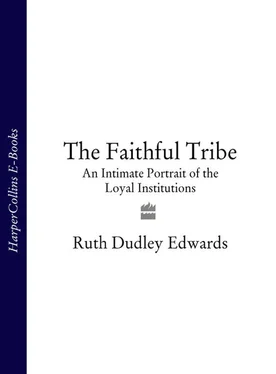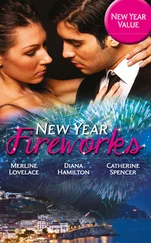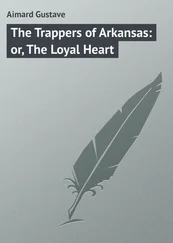The Reverend Brian Kennaway added that he’d want the book to show that the Orange Order ‘is about more than parades; the perception in England and abroad is Orange Order equals parade. We are a people with our own identity and our own moral values, and we express those values within our institution. But we are also a people with a tradition and with rights and we are in the forefront of civil rights. Every Orange banner is a civil rights banner.’
Along the way, in trying to understand why members of the loyal institutions think as they do, I’ve had to acquire an understanding of the differences within Protestantism, get a grip on several centuries of European religious wars, look at Irish history from the perspective of besieged settlers rather than of the angry dispossessed and at British history from the perspective of the Puritan rather than the Cavalier. I’ve come to appreciate the virtues of a way of life that would never suit me. To anyone who believes that I am looking at Orangeism from too positive a perspective, I can say only that that is what I do in all my books: my biography of James Connolly, for instance, is sympathetic too, and I am neither republican nor socialist.
I have been much enriched by the whole experience. But I now know without a shadow of doubt that what we have on the island of Ireland are two tribes who might be from two different planets and that no amount of rhetoric will change that reality, however unpalatable it may be to wishful thinkers. It is not until men of violence give them the chance to learn mutual trust that the tribal mentality can be overcome and people can let go of the hatreds of the past.
For the most part, the tribes can be defined as being Protestant/unionist or Catholic/nationalist, though there are significant numbers of Catholics who are happy to remain part of the British state and a handful of Protestants who have become Irish nationalists.
I’ve interviewed many of the leaders of the loyal institutions, but I’ve been just as interested in hearing the views of innumerable foot-soldiers and their spouses. I can’t mention all those who helped me and there are, sadly, others, particularly in the border areas, who do not wish to be acknowledged in case they or their families are in consequence put at greater risk from thugs and terrorists from either side. But since they are readily identifiable anyway, I will mention the Reverend William Bingham and Janet, Edwin and Gail Boyd, Harrison and Beryl Boyd, Eric Brown, Bertie Campbell, the Charlton family, George Chittick, Johnny Cowan, Tony Crowe, Richard Dallas, Gerry Douglas, Tommy Doyle, Sammy Foster, Jackie Hewitt, Jack Hunter, Roy Kells, the Reverend Brian Kennaway and Liz, Alfred and Charlie Kenwell, Cecil Kilpatrick, Warren Loan, Gordon Lucy, Jim McBride, John McCrea, Lexie McFeeter, Chris and Joyce McGimpsey, Derek Miller, Lord Molyneaux, Gordon, Graham and Heather Montgomery, the late Jack Moore, Billy Moore, Noel Mulligan, Dave Packer, George Patten, Mike and Sue Phelan, the Reverend Warren Porter, Tom and Louie Reid, Bobby Saulters, Alistair Simpson, the Reverend Martin Smyth, David and Daphne Trimble, Denis Watson, Richard Whitten, Ian Wiggins and James Wilson. I am grateful also to Ian Black, Charles Fenton, David Griffin, the Reverend Gordon McMullan, Ian Wilson, Frederick and Betty Stewart, Cephas Tay, Hilton Wickham and all the other delegates to the Imperial Council who gave so much help. To all those other Orangemen and Apprentice Boys who gave me their time and trust, I give my thanks. It has been a privilege to be welcomed into a community as you have welcomed me and to know that you expect of me only that I tell the truth as I see it.
Among the non-Orange people to whom I owe thanks are Brian Walker, who took me to my first bonfire, and to various parade companions, especially Karen Davies, Rhondda Donnaghy, Bridget and Emily Hourican, Hugh Jordan, Shelly Kang, Gary Kent, Steven King, Gus Legge, John Lloyd, Paul Le Druillenec, Jenny McCarthey, Gerry McLoughlin, Úna O’Donoghue, Paddy O’Gorman, Priscilla Ridgway, Mark and Margot Stakem and James Tansley. I’m grateful too to the many friends who put up with me despite thinking I must be mad to have embarked on a project that took me away so often to squelch through mud in the company of religiously-minded men in bowler hats who keep making a fuss about walking down roads. ‘Oh, God, you’re not going Orangeing again, are you? Be careful,’ was the usual line. I’m particularly grateful, though, to the friends who listened, even if not always sympathetically, to what I reported back or those who told me I was doing something useful. Special mention must be made of two beloved and encouraging friends, Niall Crowley and Jill Neville, who died while I was working on the book, and of Paul Bew, Chaz Brenchley, Stephen Cang, Maírín Carter, Nina Clarke, Betsy Crabtree, Robert Cranborne, Colm de Barra, Barbara Sweetman Fitzgerald, Dean Godson, Graham Gudgeon, Blair Hall, Rory Hanrahan, Eoghan Harris, Kate Hoey, Eamonn Hughes, Sylvia Kalisch, Mary Keen, Liam Kennedy, Kathryn Kennison, Kuku Khanna, Janet Laurence, Gordon Lee, John Lippitt, Robin Little, Jim and Lindy McDowell, James McGuire, Janet McIver, John and Elizabeth Midgley, Sean O’Callaghan, Eoin O’Neachtain, Henry Robinson, Des Smith, Oliver Snoddy, Veronica Sutherland, Bert Ward, Julia Wisdom and my niece Neasa MacErlean. And Martin Mansergh kindly gave me the benefit of his researches into the Orange Order.
I am very grateful to David Armstrong, editor of the Portadown Times, Graham Montgomery, Sean O’Callaghan, Mike Phelan and Henry Reid for reading and commenting on the typescript. Along with Brian Kennaway, Graham, Mike and Henry have been the Orangemen on whom I have most relied throughout the last few years for help, hospitality, wit and honest answers to innumerable difficult questions. James McGuire, an historian of the seventeenth-century and one of the few southern Catholics I know who has close friendships with Ulster Protestants, has been the non-Orange equivalent. My brother Owen, who is notoriously generous with his time and his scholarship, took tremendous trouble, picked up several errors, filled in several gaps and engaged for about eight hours on the telephone in healthy disagreement with me about certain passages – most of which I amended. Not only is he exceptionally well informed about the subject, but his Catholic perspective was a very useful corrective: I greatly appreciate his support and encouragement.
It was Alan Ruddock, who as Irish editor of the Sunday Times first gave me space to write about the Orange Order, and Aengus Fanning and Willie Kealy of the Sunday Independent who have since he left been my main indulgere. I quote from or use here articles of mine in both papers as well in the Belfast Newsletter, Daily Express, Daily Mail, Daily Mirror, Daily Telegraph, Irish Times, Portadown Times and Spectator.
Michael Fishwick of HarperCollins took me to lunch to discuss a completely different project, listened to my babbling about Drumcree, and said: ‘That’s what you’re really interested in. Why not write a book about the Orangemen?’ Not only was he invariably sympathetic and helpful, but he did not even raise an eyebrow when he was given a typescript which was twice the length agreed. He was lucky that time did not permit me to do a proper job on Orangewomen or juniors, not to speak of the Orange Order abroad. My agent, Felicity Bryan, wanted me to do something far more sensible, but she gritted her teeth and as always, backed me up. The HarperCollins team including Janet Law, Phyllis Richardson, Prue Jeffreys and Moira Reilly, did me proud and my editor, Kate Johnson, who came late and over-worked to the project, was a pleasure to deal with and always laughed rather than cried.
Читать дальше












